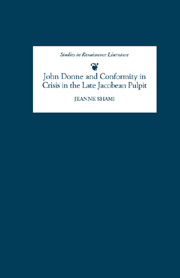Book contents
- Frontmatter
- Contents
- Dedication
- Acknowledgements
- Abbreviations
- 1 “Discreet or religious preachers”: John Donne and the late Jacobean Public Sphere
- 2 “The indiscretion of that foole”: John Knight and the Jacobean Pulpit, 1620–2
- 3 “The fishing of whales”: John Donne's Sermons, 1620–2
- 4 “Faire interpretation”: The Directions and the Crisis of Censorship
- 5 “Wise as Serpents, and innocent as Doves”: Zeal and Discretion in the Pulpit, 1623–5
- 6 “Jesus Wept”: The Journey to Spain and Pulpit Lamentation
- 7 “Blinde buzzards in the choise of a wife”: Sermons and the Moral Marketplace
- 8 “The Lovesick Spouse”: Parliament, Patriots, and the Public Sphere
- 9 “Church-quakes”: Post-Parliamentary Faultlines
- 10 “If the Foundations be Destroyed”: Rules of Engagement
- 11 “Blessed sobriety”: John Donne, the Public Sphere, and Caroline Conformity
- Works Cited
- General Index
- Index to John Donne References
- Index to John Donne's Sermons
- Studies in Renaissance Literature
11 - “Blessed sobriety”: John Donne, the Public Sphere, and Caroline Conformity
Published online by Cambridge University Press: 12 September 2012
- Frontmatter
- Contents
- Dedication
- Acknowledgements
- Abbreviations
- 1 “Discreet or religious preachers”: John Donne and the late Jacobean Public Sphere
- 2 “The indiscretion of that foole”: John Knight and the Jacobean Pulpit, 1620–2
- 3 “The fishing of whales”: John Donne's Sermons, 1620–2
- 4 “Faire interpretation”: The Directions and the Crisis of Censorship
- 5 “Wise as Serpents, and innocent as Doves”: Zeal and Discretion in the Pulpit, 1623–5
- 6 “Jesus Wept”: The Journey to Spain and Pulpit Lamentation
- 7 “Blinde buzzards in the choise of a wife”: Sermons and the Moral Marketplace
- 8 “The Lovesick Spouse”: Parliament, Patriots, and the Public Sphere
- 9 “Church-quakes”: Post-Parliamentary Faultlines
- 10 “If the Foundations be Destroyed”: Rules of Engagement
- 11 “Blessed sobriety”: John Donne, the Public Sphere, and Caroline Conformity
- Works Cited
- General Index
- Index to John Donne References
- Index to John Donne's Sermons
- Studies in Renaissance Literature
Summary
IN THE LAST years of the Jacobean church, John Donne emerged as an important public figure at the center of political culture. In several high-profile sermons – especially his sermon defending James's Directions to Preachers in 1622 and his first sermon before King Charles in 1625 – Donne tested the boundaries of this sphere and the limits of its capacity to tolerate public dispute. Both sermons were preached on official occasions, published at royal command, and reprinted. Increasingly in the late Jacobean years, however, Donne's sense of vocation demanded a private discourse of conscience as well as a public discourse of religious identity. Both of these are brought together in sermons that negotiate the crises of censorship and controversy affecting the public sphere by creating a space within it to “stand inquiring right.” The identity formed in this crucible is one that exposes tensions and fault lines in the integrity of the English church as a community of believers as well as a public, national institution still working out the terms of its doctrine, discipline, and piety.
Because we have more evidence on which to evaluate his role, Donne's importance as a public figure ought to be even more apparent to us than to his contemporaries. However, despite a reputation as an engaging preacher, Donne does not figure in the annals of political and ecclesiastical power generally documented by historians.
- Type
- Chapter
- Information
- John Donne and Conformity in Crisis in the Late Jacobean Pulpit , pp. 272 - 283Publisher: Boydell & BrewerPrint publication year: 2003



